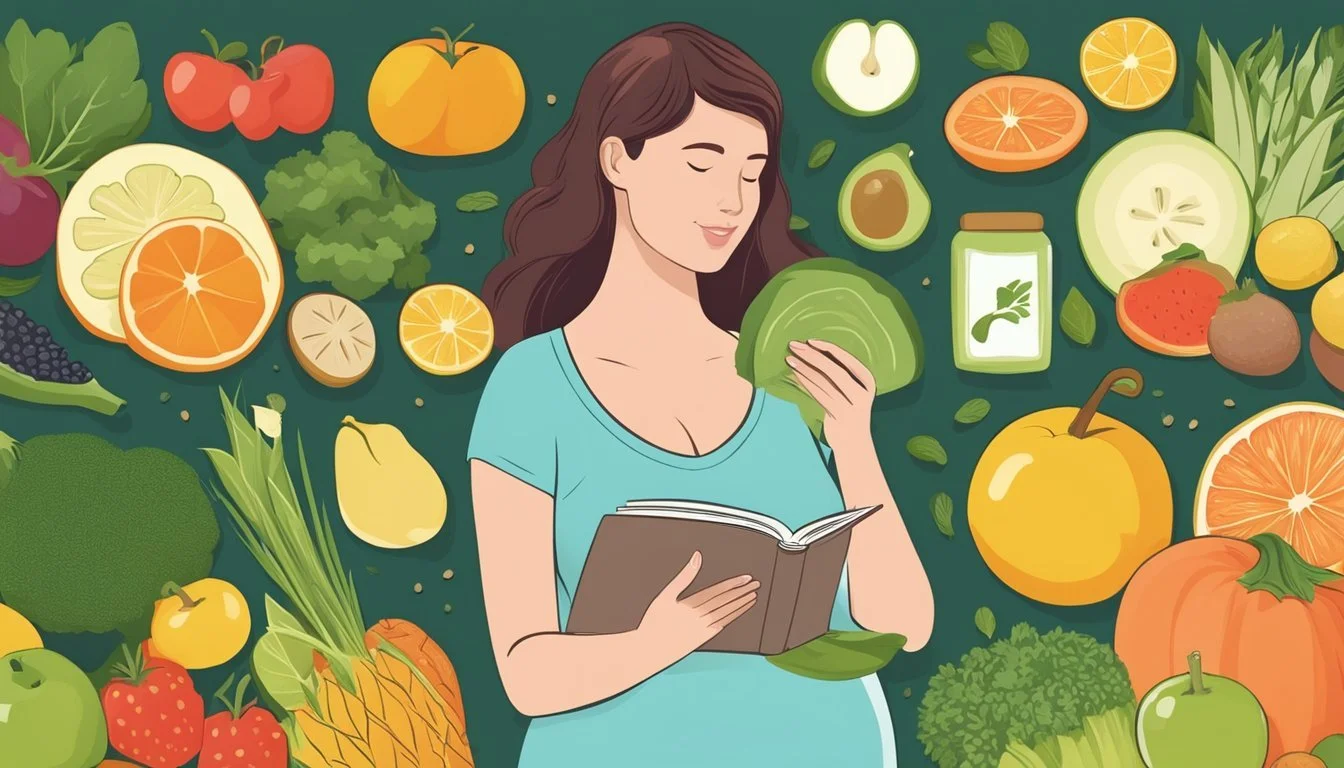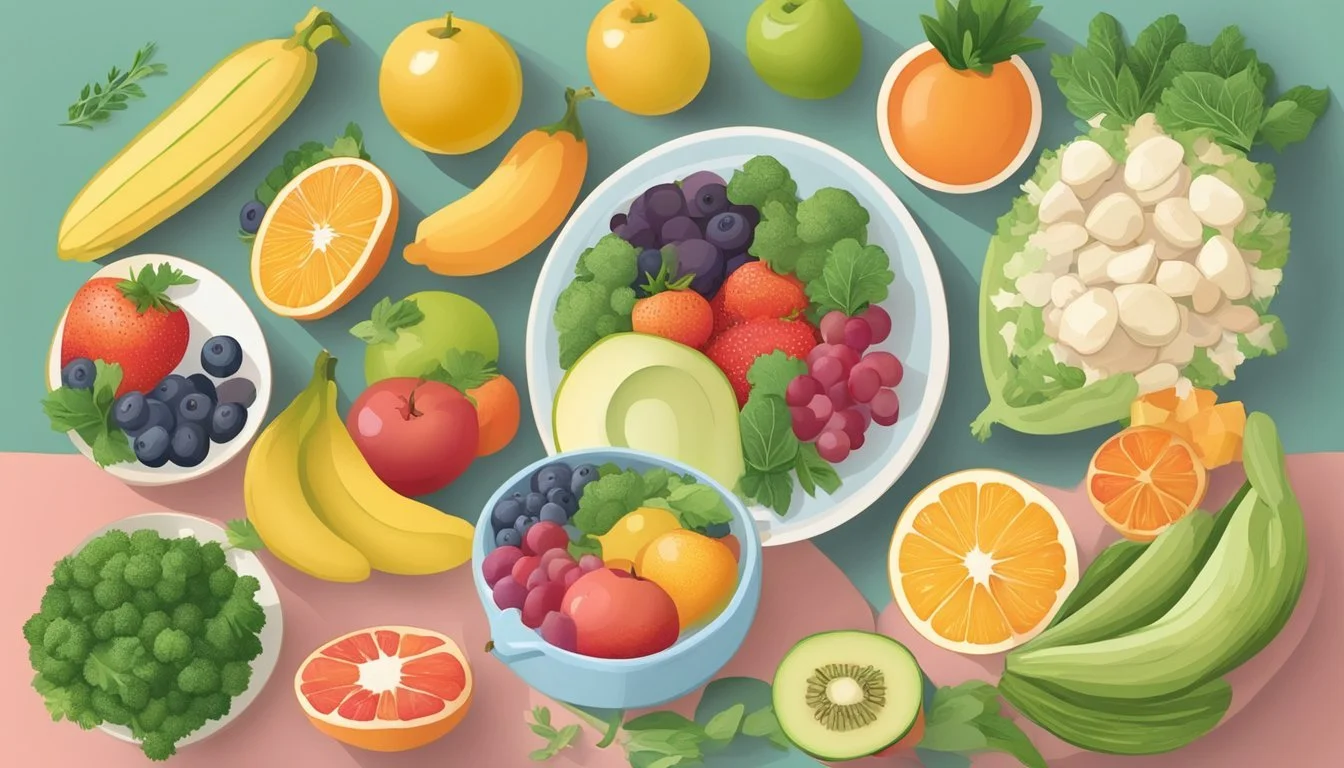Is It Safe to Follow the Flexitarian Diet While Pregnant?
Understanding Nutritional Needs
Navigating the nutritional landscape during pregnancy can be challenging, and for those considering or already following a flexitarian diet, the question of safety and adequacy comes to the forefront. A flexitarian diet is essentially a plant-based eating pattern that allows for occasional consumption of meat and other animal products. This moderate approach to vegetarianism is marked by its flexibility and inclusiveness of all food groups, making it possible to meet the diverse nutritional needs essential during pregnancy.
Pregnancy demands an upturn in certain nutrients to support both the mother's well-being and the baby's development. A balanced flexitarian diet can potentially supply these crucial nutrients, such as iron, folic acid, calcium, and DHA, which are integral to prenatal health. However, it is important for expecting mothers to plan their meals carefully. The diet should be rich in whole foods, including leafy greens, citrus fruits, whole grains, legumes, and fortified foods, to ensure adequate intake of vitamins and minerals.
Adherence to healthy eating principles while monitoring portion sizes and frequency of animal product consumption underpins the safety of a flexitarian diet during pregnancy. The diet's inherent variety can help fend off dietary boredom and allow pregnant women to enjoy a wide array of flavors while safeguarding nutritional balance. Consulting with a healthcare provider or a registered dietitian can also provide tailor-fitted guidance to meet individual nutritional needs during this critical period.
Understanding the Flexitarian Diet
The Flexitarian Diet merges flexibility with a vegetarian approach, promoting plant-based meals while allowing animal products in moderation.
Definition and Principles
The Flexitarian Diet, a term that blends 'flexible' with 'vegetarian', encourages mostly plant-based eating while permitting meat and other animal products occasionally. Its core principle is to reduce meat consumption while not eliminating it completely, thus maintaining a balanced diet that is rich in varied protein sources. It is designed for those who wish to benefit from a vegetarian diet without foregoing meat entirely, focusing on balance and variety.
Comparing Flexitarian with Other Diets
When juxtaposing the Flexitarian Diet with its counterparts:
Vegetarian Diet: Excludes all meat and fish, sometimes other animal products depending on the type of vegetarianism.
Vegan Diet: Eliminates all animal products, including dairy, eggs, and honey, focusing solely on plant-based foods.
Flexitarian Diet:
Proteins Sources: Utilizes plant proteins primarily, yet includes animal proteins.
Animal Products: Accepts animal products in contrast to vegan and some vegetarian diets.
Plant-based Eating: Emphasized, but coupled with the flexibility to consume meat.
Meat Consumption: Reduced, promoting moderation as opposed to the complete exclusion seen in vegan and vegetarian diets.
This diet embraces the concepts of moderation and variety, differing from strict vegetarian or vegan diets that have more rigid guidelines concerning animal products.
Nutritional Needs During Pregnancy
Proper nutrition during pregnancy supports the health and development of the baby and helps the pregnant individual maintain their own health. Meeting the increased requirements for certain nutrients and energy is vital for a successful pregnancy outcome.
The Role of Key Nutrients
Pregnancy demands a higher intake of key nutrients to support fetal growth and maternal health. Protein is essential as it contributes to the growth of fetal tissue, including the brain, and also supports the expansion of the mother's breast and uterine tissues. Fiber aids in digestive health, which can help manage pregnancy-related constipation. Essential fatty acids, notably omega-3 fatty acids, are important for the development of the baby's brain and retina.
Caloric and Protein Requirements
The caloric intake requirements during pregnancy typically increase to support the growing fetus and the mother's health. An additional 300-500 calories per day during the second and third trimesters are often recommended. Pregnant individuals should aim for approximately 75 to 100 grams of protein daily, depending on their pre-pregnancy weight and health condition.
Vitamins and Minerals Crucial for Pregnancy
The demand for specific vitamins and minerals increases during pregnancy. Here are some of the most critical ones:
Folic Acid (Folate): Necessary for preventing neural tube defects, the recommended daily intake is about 600 micrograms.
Iron: Vital for supporting increased blood volume and preventing anemia, expecting mothers should get 27 milligrams per day.
Calcium and Vitamin D: Critical for bone health, pregnant individuals should ensure they get 1000 milligrams of calcium and 600 IU of vitamin D daily.
Vitamin B12: Works in tandem with folate and is important for maintaining the health of the nervous system and the production of DNA and red blood cells.
A prenatal vitamin can assist in meeting these increased nutritional needs, but it is best to start taking them at least three months before conception if possible.
Adopting a Flexitarian Diet in Pregnancy
Pregnant individuals must balance nutrition for two, and a flexitarian diet allows for a customizable approach. This diet highlights the consumption of plant-based foods with moderate inclusion of animal products and emphasizes the importance of portion control for optimal health outcomes during pregnancy.
Incorporating Plant-Based Foods
A flexitarian diet during pregnancy is rich in vegetables, fruits, whole grains, beans, peas, lentils, seeds, and nuts. These plant-based foods provide essential nutrients such as fiber, vitamins, and minerals that support fetal growth. It's imperative for pregnant individuals to eat a variety of these foods to meet the increased nutritional requirements.
Vegetables and Fruits: Aim for at least 5 servings per day.
Examples: Spinach, broccoli, oranges, and berries.
Whole grains: They are vital for delivering sustained energy.
Examples: Quinoa, brown rice, and whole wheat bread.
Beans, Peas, and Lentils: These are great sources of protein and iron.
Recommended: At least 1-2 servings daily.
Including Meat and Animal Products
While plant-based eating takes center stage in the flexitarian diet, modest amounts of meat, poultry, seafood, eggs, and dairy products can be part of the meal plan. The diet acknowledges the valuable role that these foods can play in a pregnant individual's diet, delivering essential nutrients like omega-3 fatty acids, vitamin B12, and iron which are critical for pregnancy.
Meat and Poultry: Opt for lean cuts and limit processed forms.
Seafood: Choose low-mercury options such as salmon or cod twice a week.
Eggs and Dairy: A rich source of choline and calcium, respectively.
Aim for moderation to balance overall caloric and fat intake.
Monitoring Portion Sizes and Frequency
Maintaining an appropriate weight gain during pregnancy is crucial, and the flexitarian diet promotes eating in moderation. Monitoring portion sizes and the frequency of meat consumption helps manage weight gain effectively, while still fulfilling the nutritional needs required for a healthy pregnancy outcome. It's essential to adjust food choices as pregnancy progresses to cater to changing nutritional demands.
Portion Control: Pay attention to serving sizes, using practical tools like measuring cups or a recognized visual comparison (e.g., a serving of meat should be the size of a deck of cards).
Meal Frequency: Smaller, more frequent meals can aid in digestion and control weight gain.
Food Safety and Dietary Restrictions
When pregnant, it’s crucial for individuals to adhere to food safety guidelines and dietary restrictions to ensure the health of both the mother and the developing fetus. This involves understanding which foods are safe, managing cravings and aversions appropriately, and avoiding harmful substances.
Understanding Pregnancy-Safe Foods
Pregnant individuals must focus on nutrient-dense foods that support fetal development while also accommodating the flexitarian diet. Emphasis should be on:
Whole grains like quinoa and brown rice
Plant proteins such as beans, lentils, and tofu
Leafy greens and other vegetables
Fruits
Dairy or fortified plant-based alternatives for calcium
Oily fish in moderation, which supply omega-3 fatty acids but should be chosen carefully to avoid high mercury content
Care should be taken to ensure all meats, if consumed, are thoroughly cooked to prevent the risk of infections like toxoplasmosis from undercooked meat. Unpasteurized dairy and certain soft cheeses should be avoided due to the risk of bacteria like listeria.
Managing Food Cravings and Aversions
During pregnancy, cravings and aversions are common, and they might challenge eating habits. For instance, one might crave high-sugar or high-salt foods, or have aversions to specific vegetables or proteins. While following cravings in moderation is generally safe, maintaining a balanced diet from all food groups is important. Here are ways to manage cravings:
Opt for baked sweet potatoes instead of fried foods for a nutrient-dense alternative to manage unhealthy fat cravings.
Use herbs and spices to flavor dishes as alternatives to salt.
Moreover, individuals should be mindful of pica—a condition characterized by cravings for non-food items—which can be harmful and necessitates medical advice.
Avoiding Harmful Substances
To protect the fetus from potential harm, pregnant individuals on a flexitarian diet must avoid:
Alcohol and caffeine: These should be eliminated or intake should be limited according to health care provider recommendations.
High-mercury fish: Such as shark, swordfish, king mackerel, and tilefish.
Raw sprouts: They might contain harmful bacteria.
Unwashed produce: Always wash fruits and vegetables to remove potential pesticides and bacteria.
By carefully selecting and preparing foods within the flexitarian diet's framework, pregnant women can maintain a safe and wholesome diet that supports fetal development and personal health.
Potential Health Benefits and Risks
When pregnant, carefully considering dietary choices is crucial, as they impact both maternal and fetal health. The flexitarian diet, with its emphasis on plant-based foods and occasional meat consumption, poses potential benefits and risks during pregnancy.
Advantages of Flexitarian Eating
The flexitarian diet can offer pregnancy-specific health advantages such as reduced blood pressure and a lower risk of developing type 2 diabetes—conditions that can affect both the mother and the unborn child. It is characterized by:
High intake of vegetables, fruits, whole grains, and plant-based proteins
Moderate consumption of dairy products and eggs
Occasional meat and fish inclusion for flexibility
This varied and moderate approach provides essential nutrients and healthy fats which are vital during pregnancy. For example, omega-3 fatty acids found in oily fish such as salmon are important for fetal brain development.
Possible Nutrient Deficiencies
On the flip side, the flexitarian diet could lead to nutrient deficiencies if not carefully managed. These are some of the nutrients that might be at risk:
Iron: Plant-based sources are not as easily absorbed as those from meat.
Vitamin B12: Primarily found in animal products and essential for brain health.
Calcium: Important for bone development, may require fortified foods or supplements.
Pregnant individuals should consult healthcare providers to ensure they're meeting their heightened nutritional needs.
Weight Management During Pregnancy
Proper weight management is crucial during pregnancy. The flexitarian diet may aid in maintaining a healthy weight due to its focus on high-fiber, nutrient-rich foods, which can promote satiety and moderate weight gain. It is important, however, to avoid the pitfall of using this diet for weight loss during pregnancy, as it may deprive the fetus of crucial nutrients. Key considerations include:
Ensuring a balanced calorie intake to support fetal growth.
Monitoring weight gain to align with healthcare guidelines.
Emphasizing nutrition over calorie restriction.
A flexitarian diet, when planned with professional guidance, can be a healthful lifestyle for pregnant individuals. It supports weight management and provides numerous health benefits, yet vigilance is required to prevent nutrient shortfalls.
Developing a Balanced Meal Plan
When pregnant and following a flexitarian diet, it is essential to craft a meal plan that ensures both maternal and fetal nutritional needs are met. This entails incorporating a variety of foods to provide sufficient vitamins, minerals, and macros while moderating meat intake.
Sample Meal Ideas
A balanced meal plan embraces a diversity of food groups including grains, leafy greens, yogurt, fatty fish such as salmon for omega-3s, and orange juice fortified with calcium and vitamin D.
Breakfast:
1 slice of whole-grain toast with low-fat cheese and avocado
1 cup of orange juice (calcium and vitamin D fortified)
Lunch:
Salad with leafy greens, cherry tomatoes, feta, chia seeds, and walnuts
Grilled chicken or falafel for protein
Snack:
Yogurt with sliced almonds and berries
Dinner:
Quinoa with roasted vegetables and lean beef or marinated tofu
Side of steamed broccoli or other green leafy vegetables
Note: Whole grains provide fiber, essential vitamins, and slow-releasing energy. Including prenatal vitamins can help cover any nutritional gaps.
Consulting with Health Professionals
Pregnant individuals should regularly consult with healthcare providers to tailor their meal plans. Health professionals can offer specific guidance on appropriate portions of poultry, lean meat, and fatty fish, while ensuring intake of vital nutrients like folic acid, iron, and calcium is optimal. They can also advise on the safety of consuming certain cheeses like feta and the quantity of nuts and seeds that can be safely included in the diet.
Considerations for Postpartum and Breastfeeding
After childbirth, special attention should be given to the mother's nutritional needs, especially if she follows a flexitarian diet and decides to breastfeed. Ensuring a balanced intake of nutrients is crucial for recovery and milk production.
Nutrition for Recovery and Lactation
During the postpartum period, a mother's body undergoes significant recovery. A flexitarian diet during this time should be rich in essential nutrients, which supports healing and provides the energy needed for caring for a newborn. Breastfeeding mothers require additional calories; hence, their diet should be calorically appropriate to sustain lactation.
Key nutrients include:
Omega-3 fatty acids: Essential for the baby's brain development and found in flaxseeds, walnuts, and plant-based oils.
Calcium: Vital for bone health, sourced from dairy products, fortified plant milks, and leafy green vegetables.
Vitamin D: Important for bone health and immune function, which can be obtained from sunlight exposure and fortified foods.
Iron: Crucial for replenishing the mother's blood supply and preventing anemia, available in legumes, fortified cereals, and dark leafy greens.
Vitamin C: Aids in the absorption of iron and is essential for tissue repair, found in citrus fruits, strawberries, and bell peppers.
Breastfeeding women following a flexitarian diet should continue with their prenatal vitamins to ensure no gaps in their nutritional needs. It's also beneficial to consult with a healthcare provider to determine if any specific dietary adjustments or supplements are necessary to maintain optimal health during the postpartum phase and breastfeeding period.
Conclusion
In summarizing the considerations for the flexitarian diet during pregnancy, it is underscored that a flexitarian diet can be a beneficial approach to healthy eating for expectant mothers. It typically includes a variety of plant-based foods like vegetables, fruits, legumes, and whole grains, while still allowing for occasional meat and fish consumption, offering a broader spectrum of essential nutrients. This balance can support both the nutritional needs of the mother and the developing fetus.
Heavily processed meats, however, should be minimized as they are associated with a higher risk of chronic diseases and may undermine maternal health. The inclusion of dairy or alternative sources is encouraged for the adequate intake of calcium and vitamin D, vital for bone health.
Expectant mothers should also consider the advice of a registered dietitian to tailor their diet plans, ensuring that key nutrients such as iron, folate, and omega-3 fatty acids are adequately sourced for the wellbeing of both mother and baby. It is also essential to practice food safety rigorously to minimize the risk of foodborne illnesses that could potentially affect pregnancy outcomes.
Careful attention to food choices and portion sizes will serve as a cornerstone for maintaining an appropriate weight throughout pregnancy, as this impacts overall health. A flexitarian lifestyle, keenly focused on nutrition, exhibits the potential to promote a healthy pregnancy when aligned with the medical guidance provided by healthcare professionals.








